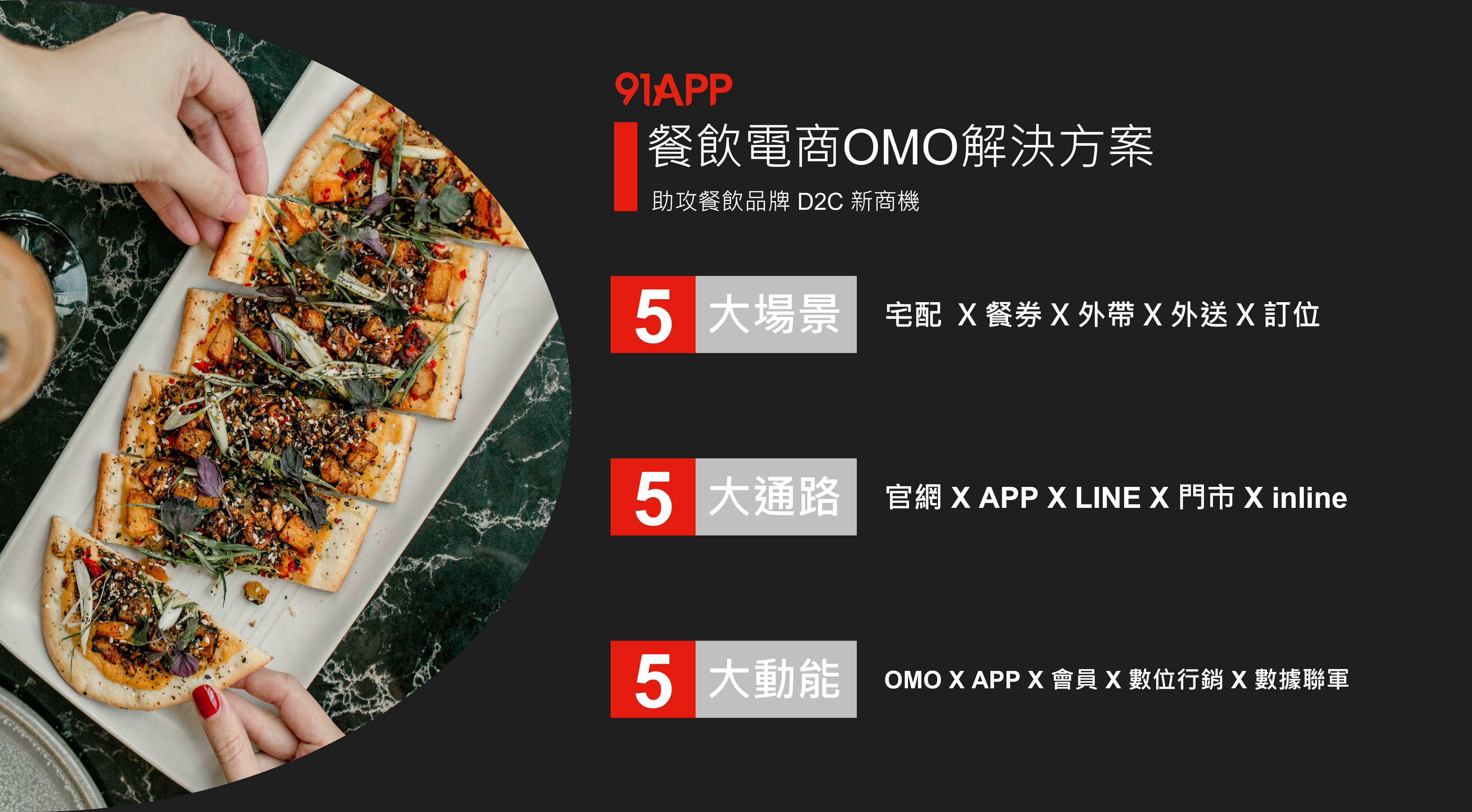
2022-04-22
Taiwan is progressively moving toward a policy of coexistence with the virus. Still, as the number of confirmed cases rises, not only the retail but also the food and beverage industry is bearing the brunt of the impact. According to Ministry of Economic Affairs figures, the overall value of the F&B sector will reach NT$700 billion in 2021. The data reveals that, compared to past years, the share of digital platforms such as delivery and logistics has increased significantly, indicating that customers’ dining habits have changed substantially because of the pandemic.
91APP, Taiwan’s first SaaS service company to go public, has released the “OMO Solution for food and beverage e-Commerce”, with the goal of applying the OMO methodology that has effectively transformed the retail sector to the F&B industry, to help them overcome the challenges of digital power in the pandemic. The solution will enable F&B enterprises that have not been able to properly integrate omni-channel membership data and apps to accelerate digital transformation, while developing first-party data, through F&B e-Commerce and OMO strategies, to effectively grab data, offer emergency services, and realize omni-channel operating benefits, even in the face of an uncertain market scenario.
“Today, fragmented membership data and scattered digital resources are two largest challenges in the F&B industry, especially for medium and large F&B businesses which lack highly integrated and scaled CRM solutions,” stated Happy Lee, CPO of 91APP. “Even if they turn to order take-out, delivery services, and even start their e-Commerce when the pandemic strikes, reservations, take-out, delivery, logistics, e-gift card and so on, from the physical restaurants to online various consumption scenarios, member data, and system connections have not been effectively integrated yet. As a result, the number of people in restaurants fell when the pandemic struck. Without data, it was not possible to communicate with VIP members online. Other channels, such as delivery platforms, were needed to locate new consumers. This had a significant impact on operations and was immediately reflected in performance.”
According to Happy’s analysis, the scene in restaurants has long been the main force in the F&B industry. It places a high value on the quality and environment of the eating experience as it interacts directly with consumers. Although F&B brands have significant numbers of consumers, they are rarely converted into digital members for follow-up and behavior data, leaving a major gap in their digital operations. When a pandemic strikes, customers are lost quickly. However, due to the differences in structure, retail brands have seen promotions and purchases made by distributors and platforms, which inspired them to think about membership management. In addition, they have worked harder in recent years to develop OMO (Offline-merge-online) omni-channel membership.
Direct-to-consumer (D2C) and OMO operations are the two cornerstones of the retail industry’s successful transition. The F&B industry’s operation method is native “direct-to-consumer,” according to Happy. If it can integrate multiple consumption scenarios with member data and achieve virtual and real integrated management, there will be plenty of potential for development.
He went on to point out that the period of depending on high table turnover rates is over, and that creating the power of “private traffic” and “data monetization” is the present objective of many retail businesses, and will be a key goal for many F&B companies in the future. The primary challenges faced by Taiwan F&B companies are the dispersion of member data and digital resources. F&B companies of all sizes urgently need a set of large-scale management methodologies and excellent omni-channel integration.
91APP’s “OMO solution for F&B e-Commerce” is designed to assist medium and large F&B companies in contending with the coexistence of the virus. It covers the following five scenarios: e-gift card, logistics, take out, delivery, and reservation/order meal, integrating five channels, official website, APP, LINE, restaurant, reservation system (such as inline), as well as the integration of five growth momentum OMO operation, POS, ERP, MarTechs, and AdTechs. In order to unleash the power of “private traffic” and “data monetization” for F&B brands, create new catering experiences, and drive new performance growth.
91APP has supported a number of large-scale retail enterprises in implementing successful digital transformations, demonstrating a high level of maturity in retail OMO and CRM services. Happy said that now 91APP wants to introduce 91APP’s proven solution to the F&B sector to help with digital transformation. It will assist F&B companies in achieving omni-channel membership management and promoting membership contribution growth. 91APP also aggressively integrates the power of the data alliance, assisting catering companies in developing digital capabilities and improving the consumption effectiveness and conversion rate of online and in-store restaurants through strategic collaboration.
For example, 91APP has partnered with Inline, the largest restaurant booking management SaaS company in Taiwan, to deliver a one-stop experience by integrating the booking management solution into the F&B e-Commerce solution. In addition, 91APP has partnered with SAP, the market leader in ERP software, to help customers import AI marketing automation to maximize the benefits of the brand’s own data, which can also be applied to F&B e-Commerce in the future.
The era of coexistence with the virus is coming. Since F&B brands already have the advantages of “native D2C”, Happy believes they can stay ahead of market changes if they master first-party data and omni-channel member management by implementing “F&B e-Commerce” and OMO strategies as soon as possible.